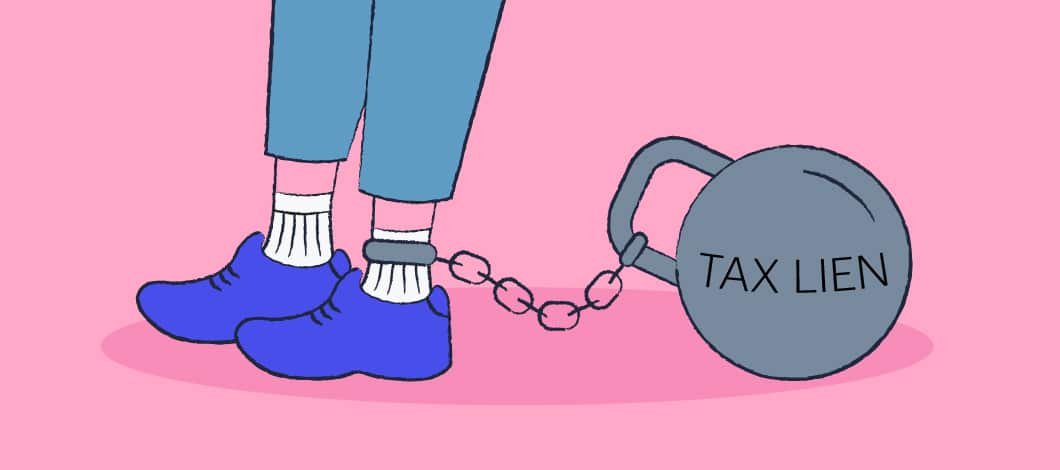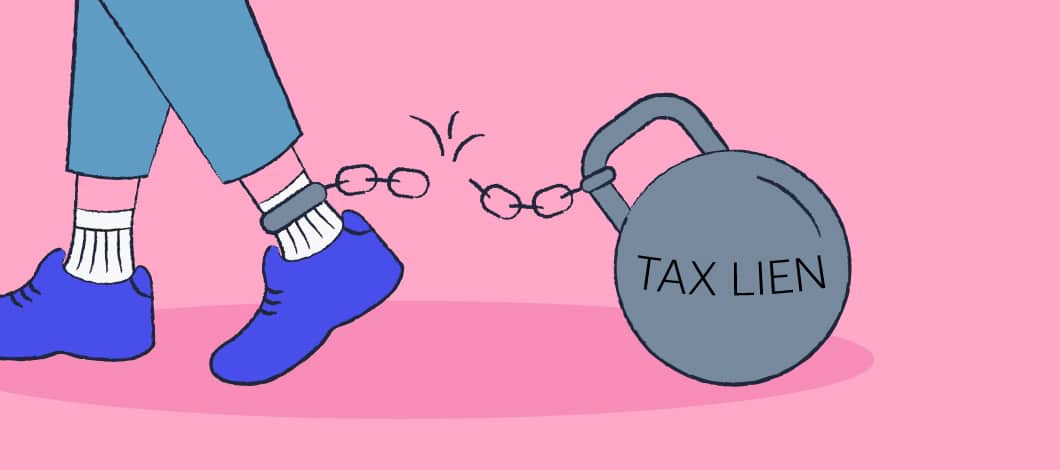Getting a business loan when you have a tax lien is a difficult obstacle to overcome. Learn about the implications of a personal or business lien when you’re seeking funding. Plus, find out what you need to know to be considered for financing when you’re on the hook for back taxes.
What Is a Tax Lien?
A tax lien is a government’s right to lay claim to business or personal property to settle tax debt that’s in arrears. Tax liens can be executed at the local, state or federal government level. For example, a local government could place a tax lien if a person or business is behind on property taxes.
A lien is filed against your business’s assets if you’re delinquent on business taxes. Similarly, a lien is placed on personal assets if you’re in arrears on personal taxes. A sole proprietor, however, could have a tax lien placed on both personal and business assets.
The following are examples of unpaid taxes for which liens can be filed:
- Corporation taxes
- Sales and use taxes
- Employer withholding taxes
- Income taxes
- Inheritance taxes
- Realty transfer taxes
- Property taxes
A federal tax lien takes priority against any other liens. That’s why many lenders don’t like to risk loaning funds when tax liens are involved.
Where the government is concerned, a tax lien allows for the seizure (levy) of the delinquent party’s assets if the taxpayer does not communicate with the government regarding the debt owed, and the back taxes remain unsettled.
What Assets Are Fair Game in a Tax Lien?
A tax lien attaches to all of your assets, which could include any of the following:
- Vehicles
- Bank accounts
- Real estate
- Securities
- Business accounts receivable
- Business property
- Future assets acquired while the lien is in effect
If the delinquent party files for bankruptcy, the federal tax debt remains valid as does the federal government’s claim of the property through the lien.

Can You Get a Loan With a Tax Lien?
Yes, you could be able to get a loan with a tax lien. However, this is not an easy feat by any means. Until your personal or business lien is resolved, you won’t be deemed a viable applicant for bank or SBA loans, which offer some of the most competitive interest rates and terms. Depending on your specific circumstance, though, you could be able to secure financing with an alternative lender.
How to Get a Loan When You Have a Tax Lien in 5 Steps
1. Make Sure Tax Lien Records Are Correct
As with all things, mistakes happen. And mistakes with tax-lien filings are no exception. Check for the accuracy of any tax liens filed against you and your business. Errors might exist regarding the amount of outstanding taxes, for example.
For property liens, contact the office of your county prothonotary, clerk of court, assessor or recorder. At the state level, you may contact the Department of Revenue, though some states may post tax lien lists online, such as North Carolina’s Secretary of State site and the Florida Department of Revenue site. Check your local DMV website or contact the agency to find out about vehicle liens.
The following is information that you could find on a tax lien filing:
- File number
- Taxpayer name
- Address
- Filing date
- Secured parties
- Type of tax
- Tax period ending date
- Assessment date
- Unpaid balance
If you notice tax lien errors that need correction, contact the government agency that recorded the lien or follow the steps in the lien filing notice you received.
2. Start Repaying the Lienholder
Make an effort to set up an arrangement with the government agency that filed the tax lien. This could lessen the impact of the lien and put you in a better position in the eyes of lenders.
With the IRS, you have several options if you’re unable to pay in full:
- Payment plan: Apply online for a repayment plan with monthly installments (both businesses and individuals could qualify)
- Offer in compromise: You may be able to settle your tax debt for less than the full amount with this option.
- Request a delay in collection: A request to delay does not eliminate the debt, and penalties and interest accrue until the outstanding balance is paid in full.
3. Demonstrate an Otherwise Solid Track Record
If there’s room to improve your business credit score and personal credit score, take the necessary steps to improve your chances of getting a loan. Additionally, it’s important to show lenders you have positive cash flow and will have sufficient revenue to repay the loan you’re requesting.
It’s important to note that as of 2018, the 3 major credit bureaus, Equifax, Experian and TransUnion, removed tax liens from consumer credit reports. However, business tax liens are reported on a business credit report.
4. Contact Alternative Lenders
Some nonbank alternative lenders might approve you for financing even if you have a tax lien. Small business loans available with tax liens could include a short-term loan or a business line of credit. You might also qualify for an alternative financing product, such as a merchant cash advance or invoice financing. Even so, options will be limited, and interest rates will likely be higher.
5. Be Ready to Offer Details About Your Lien Repayment
Alternative lenders evaluate small business applicants with tax liens on a case-by-case basis. Be ready to offer up all the details of your lien repayment schedule and terms. The lender will take this information, along with other factors, including your credit score, credit history, revenue and cash flow, into consideration when evaluating you for a loan.

How to Reduce the Impact of an IRS Tax Lien
Paying off your outstanding balance in full before applying for a loan is the best way to reduce the adverse effects of a tax lien. The IRS releases liens within 30 days of receiving all outstanding tax debt. However, it’s important to note that even when the lien is released, it’s still a matter of public record unless withdrawn.
Here are other options the IRS offers for lessening the impact of your lien:
- Discharge: This removes a tax lien from a specific property.
- Subordination: While this option doesn’t remove a tax lien, the IRS doesn’t take priority on the lien, allowing other creditors to move up.
- Withdrawal: With withdrawals, taxpayers remain liable for the balance they owe. However, the public notice of a federal tax lien is removed. The IRS may issue a withdrawal once you’re set up on a repayment plan.
Applying for Business Financing Despite a Tax Lien
Of course, the easiest way to avoid a federal tax lien on your LLC or a state tax lien on your S Corp is to pay your taxes when they’re due. That said, sometimes, paying on time just isn’t an option when you’re in a cash crunch.
Albeit very challenging, there are ways to improve your status in the eyes of some lenders and perhaps obtain financing. If you do your best to strengthen every other consideration factor before applying for a business loan, you may have a chance.










